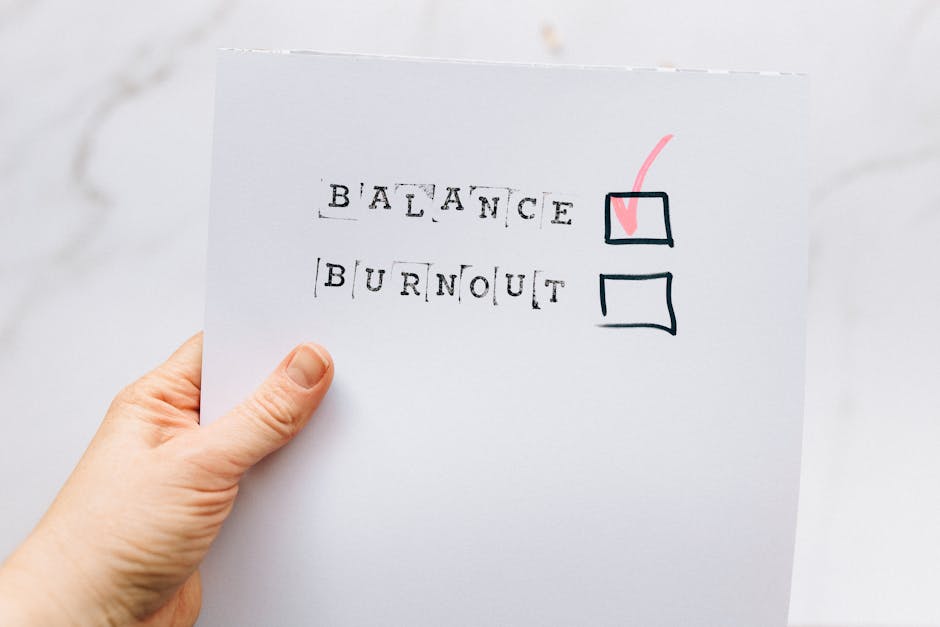How to Prevent Burnout: A Comprehensive Guide
In today’s fast-paced and demanding world, burnout has become a prevalent issue affecting individuals across various professions, industries, and lifestyles. Burnout is more than just feeling tired or stressed; it is a state of emotional, physical, and mental exhaustion caused by prolonged or excessive stress. If left unchecked, burnout can have serious consequences on one’s health, relationships, and overall well-being. It is crucial to recognize the signs of burnout and take proactive steps to prevent it from taking hold.
The Impact of Burnout

Burnout can manifest in various ways, including feelings of cynicism, detachment, and a sense of ineffectiveness. It can lead to a decline in productivity, motivation, and overall satisfaction with work and life. In severe cases, burnout can contribute to serious health issues such as depression, anxiety, and chronic illnesses. Recognizing the signs of burnout early on is essential to prevent it from escalating and taking a toll on one’s physical and mental health.
Understanding the Causes of Burnout

There are several factors that can contribute to burnout, including high workloads, lack of control, unclear expectations, and a lack of support from colleagues or supervisors. Additionally, perfectionism, poor work-life balance, and a lack of boundaries between work and personal life can also increase the risk of burnout. It is essential to identify the root causes of burnout to effectively address and prevent it.
Effective Strategies for Preventing Burnout

1. Prioritize Self-Care
Self-care is crucial for maintaining one’s physical, emotional, and mental well-being. This includes getting an adequate amount of sleep, eating a healthy diet, exercising regularly, and engaging in activities that bring joy and relaxation. Setting aside time for self-care can help reduce stress, improve resilience, and prevent burnout.
2. Establish Boundaries
Setting boundaries between work and personal life is essential for preventing burnout. This includes establishing clear work hours, taking breaks throughout the day, and avoiding work-related tasks during non-work hours. Learning to say no to additional responsibilities and delegating tasks when necessary can also help prevent burnout.
3. Manage Stress Effectively
Stress management techniques such as deep breathing, meditation, yoga, and mindfulness can help reduce stress levels and prevent burnout. Engaging in activities that promote relaxation and calmness, such as listening to music, spending time in nature, or practicing gratitude, can also be beneficial in preventing burnout.
4. Seek Support
It is essential to seek support from friends, family, colleagues, or mental health professionals when experiencing burnout. Talking about one’s feelings, seeking advice, and receiving emotional support can help alleviate stress, provide a different perspective, and prevent burnout from worsening.
5. Practice Mindfulness
Mindfulness involves being fully present in the moment and paying attention to one’s thoughts, feelings, and surroundings without judgment. Practicing mindfulness techniques such as meditation, breathing exercises, and body scans can help reduce stress, improve focus, and prevent burnout. Integrating mindfulness into daily routines can promote self-awareness, resilience, and overall well-being.
Common Misconceptions About Burnout

One common misconception about burnout is that it is solely caused by work-related stress. While work-related stress can contribute to burnout, it is not the only factor. Burnout can also be caused by personal issues, relationship problems, financial stress, and other external factors. It is essential to recognize the multifaceted nature of burnout and address all contributing factors to prevent it effectively.
Conclusion
In conclusion, burnout is a serious issue that can have profound effects on one’s physical, emotional, and mental health. By understanding the causes of burnout, recognizing the signs early on, and implementing effective prevention strategies, individuals can take proactive steps to protect themselves from burnout. Prioritizing self-care, establishing boundaries, managing stress effectively, seeking support, and practicing mindfulness are key strategies for preventing burnout and promoting overall well-being. By taking care of oneself and being mindful of one’s needs, individuals can reduce stress, improve resilience, and maintain a healthy work-life balance.
To wrap things up, preventing burnout requires a proactive approach, self-awareness, and a commitment to self-care. By prioritizing one’s well-being and taking steps to address the root causes of burnout, individuals can protect themselves from the negative effects of burnout and lead a more fulfilling and balanced life.




